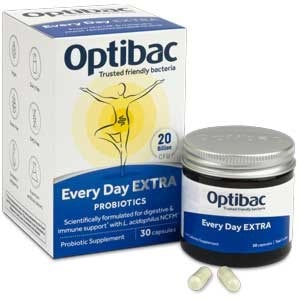The Food Myth
The Myth:
"You can get all the probiotics you need from your diet."
Research says:
Fermented foods are great for general health, but they can’t be easily compared to probiotic supplements.
The diet is the first place to start for many aspects of our health. To look after the gut microbiota, it’s helpful to increase probiotic and prebiotic consumption to boost overall friendly bacteria counts, and to decrease excess fast food, sugar and alcohol consumption which work negatively against the microbial balance.

Common food sources of prebiotics (food to feed the probiotic bacteria) include onions, garlic and bananas. Common fermented foods containing microorganisms include natural bio-yoghurt, sauerkraut, kefir, kombucha and kimchi. Whether these foods are purchased in a shop or fermented at home, the live cultures they contain will vary from batch to batch depending on the growing conditions. In this way the probiotic content in fermented foods is much less certain compared to a probiotic food supplement, which has been created to contain the strains stated on the packaging. One cannot comfortably compare a fermented food to a high quality probiotic supplement which has been shown in clinical trials to give particular health benefits.

Whilst the microorganism (probiotic) content in fermented foods is subject to the fermentation environment, the number of microorganisms in commercially-available fermented foods is often undetermined, and in many cases is thought to be lower than in probiotic supplements. To match the doses in probiotic supplements high amounts of fermented foods usually need to be consumed1. Live yoghurt is the most popular fermented food in the West, but intolerance to dairy products is on the rise, and many yoghurts and yoghurt drinks containing friendly bacteria are loaded with as much as 3 teaspoons of sugar per serving. Most importantly, there are certain aspects of health for which specific probiotic strains, not commonly available in our diets, are best researched. Heathcare professionals can head over to the Probiotics Database to read more about the following examples: S. boulardii for occasional diarrhoea2, B. lactis BB-12® for bowel regularity3, L. rhamnosus Rosell-11 and L. acidophilus Rosell-52 for digestive disturbances associated with antibiotic use4. In these cases eating fermented food is unlikely to give sufficiently targeted probiotic therapy to see desired outcomes, compared to specifically researched probiotic strains.
Look out for:
Fermented foods as part of a healthy diet, alongside a quality probiotic supplement.
Further Reading
What's the difference between probiotics and digestive enzymes?
This myth has been busted by Megan Crowch, BSc (Hons) Physiology, Herbal Medicine Diploma (IRH practicing member).
References
- Most fermented foods do not state CFU (colony forming units) at date of manufacture or at date of expiry on the packaging, nor on any information made available to consumers. In a survey of fermented foods available on the UK market only one supplier of Kefir provides information that 6 billion CFU are present in 250ml.
- McFarland (2010) Systematic review and meta-analysis of Saccharomyces boulardii in adult patients. World J Gastroenterol; 16, 18: 2202-22.
- kesen et al. (2015) Effect of the probiotic strain Bifidobacterium animalis subsp. lactis, BB-12®, on defecation frequency in healthy subjects with low defecation frequency and abdominal discomfort: a randomised, double-blind, placebo-controlled, parallel-group trial. Br J Nutr; 114, 10: 1638-46.
- Foster et al. (2011) A comprehensive post-market review of studies on a probiotic product containing Lactobacillus helveticus R0052 and Lactobacillus rhamnosus R0011. Benef Microbes; 2, 4: 319-34.
You might also be interested in:
The Research Myth
The Antibiotic Myth
The Strain Myth
The Survival Myth
The Numbers Myth
The Cure-All Myth
The Billions Myth
The Fridge Myth
